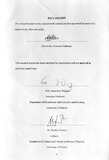| dc.description.abstract | Education is both consumption and investment. Education equips people with skills and knowledge that enable them to increase their productive capacities and hence receive higher earnings. It is seen as a means of promoting equality; though at times contribute to inequality. Those who obtain a good basic education continue to learn throughout their lives to remain economically viable. The purpose of the study was; to investigate the school based factors influencing pupils' wastage in public primary schools in Mwala Division, Mwala District, Kenya. The following objectives guided the study; to examine the provision of instructional materials' influence on pupils' repetition in public primary schools; to determine how level of teacher training affects pupils' dropout in public primary schools; to examine how pupils' age influence dropouts in public primary schools and to establish the extent to which teacher-pupil ratio affects pupils' dropout in public primary schools in Mwala Division, Mwala District.
This study was guided by production function theory. The study employed descriptive survey design. It targeted 20 head teachers, 156 teachers, eight repeaters and eight pupils who dropped and resumed back after some time from each sampled school. Purposive sampling was used to select the pupils for focus group discussion. The research instruments used in this study were questionnaires, focus group discussion and document analysis. Qualitative and quantitative data was analyzed using the Statistical Package for the Social Sciences (SPSS) to increase accuracy of results. The following are the findings of the study, that the majority of the teachers (65.3%) indicated that the rate of textbooks per pupils were 1:3 except for a few subjects and classes.
The focus group discussion with both the repeaters and those who had dropped out also established that there were no adequate textbooks and other instructional materials. The study revealed that 30.5 percent of the teachers noted that the skills helped them to identify different learners and their abilities including pupils with special needs. Another finding was that 21.2 percent of them were able to group learners according to their abilities. The study revealed that 30.5 percent of the teachers noted that the skills helped them to identify different learners and their abilities including pupils with special needs. The study established that the majority of the teachers noted that they pay individual attention to every pupil in class hence reducing cases of drop out in class. To curb drop out cases in their schools majority of the headteachers (83.3%) cited the availability of guidance and counselling and 55.6 percent of the headteachers agreed that guidance and counselling was an effective measure of curbing dropout of pupils.
The following conclusions' were drawn; that lack of enough instructional materials influenced drop out. The level of teacher training did not affect pupils drop out of school. There were other reasons that contributed to pupils drop out. The reasons as to why pupils drop out of school were peer pressure, work as labourers, family problems and low self esteem among others. Although some teachers were able to give individual attention to every pupil in class, there were some that had no much time to be able to attend to all pupils. Some of the suggested remedy by the headteachers was guidance and counselling to all pupils. The following recommendations were made, provision of adequate instructional materials would prevent drop out in schools. To encourage more pupils to have individualized attention from the teachers, Teacher Service Commission should be encouraged to employ more teachers. Guidance and counselling and parent's participation in their children's learning should be encouraged through the sehool administration inviting parents' to come to school and discuss their children performance. | en_US |

